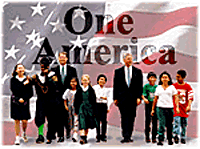 |
 |
The Shared Mission Focus on Young People (SMFYP) is a global initiative in The United Methodist Church (UMC) that began in January 1997. The project is a four-year effort to reorder the priorities of the denomination to better respond to the needs of young people between the ages of 12 and 30. The SMFYP effort is urging all segments of the denomination to move beyond their comfort zones and create new cutting-edge ministries with young people to decrease youth unemployment, to challenge racism by strengthening multicultural relationships, to prevent violence, to nurture spiritual growth and to provide opportunities for youth to communicate with each other in creative ways. By distributing grants, SMFYP is funding 27 pilot projects in various congregations to achieve its objective. Thus far, $1.7 million have been allocated to fund these projects and matching funds have been donated by local churches and annual conferences. The UMC is predominantly white, and the diversity within the church tends to exist between, and not within, its congregations. In recognition of this fact, one of the criteria in the grant process is that local churches forge a partnership with other churches or communities to enable young people from different congregations to interact, break down barriers and share resources. To further facilitate this goal, the SMFYP works closely with three other UMC Initiatives: the Hispanic Plan, the Native American Plan, and the Strengthening the Black Church for the 21st Century initiative. The 27 projects of the SMFYP are designed to look for long term solutions instead of a quick fix. For example, Chinese UMC and Chinese Methodist Center Corporation in New York City address issues of despair, loneliness and low self-esteem found in Chinese American youth between the ages of 13 and 18, living in New York City neighborhoods with a significant Chinese-American population. The program will provide opportunities for community service, video-resource development and personal counseling, as well as help the young people identify long term solutions. Another example is the program at the Hobson UMC in Nashville, Tennessee called Youth Empowered for Service, Survival and Self-esteem (YESSS). Hobson UMC, an urban congregation with both black and white members, has joined Brentwood UMC, a white suburban congregation, to create this project. The two congregations are sharing resources such as funding and volunteers, in order to achieve their goal. This program will employ a full time community organizer/conflict resolution specialist to work with at-risk youth in the Nashville area. The initiative will conduct six to eight hearings on youth violence, field test an eight-week series on conflict resolution and peer mediation with YESSS program participants and other interested groups, hold a youth Forum co-sponsored by the Black Children's Institute and the local Juvenile Court, and establish an East Nashville mediation center. Outcomes and Significant Accomplishments As a result of SMFYP, the congregations involved have found that hope has increased among the young people in their communities as they learn to understand each other and find a voice in their congregations. Also, SMFYP has created new positive energy within the denomination as a whole. The program has enabled and encouraged local churches to begin to deliberately address the issues of race and diversity as well as other issues facing young people. The program has also resulted in many new inter-congregational partnerships that foster multiculturalism and understanding.
|
![]()
To comment on this service,
send feedback to the Web Development Team.
![[White House icon]](/New/images/home_pin.gif)
![[Help Desk icon]](/New/images/help_pin.gif)